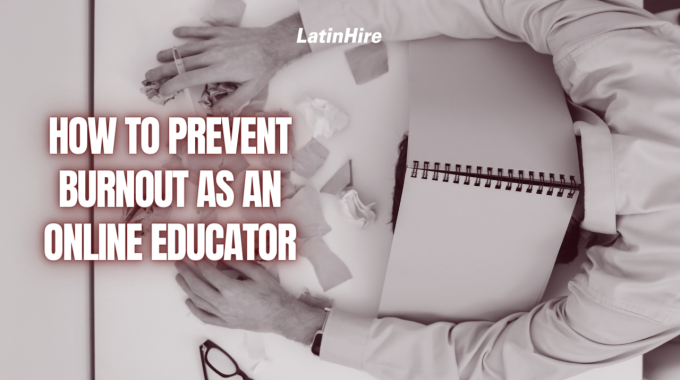As online teachers and tutors, we heavily rely on Zoom to teach and connect with…

How to Prevent Burnout as an Online Educator
Online teaching has become increasingly popular in recent years, with many educators opting for virtual classrooms over traditional ones. However, teaching online comes with its unique set of challenges, including the risk of burnout.
Burnout is a state of physical, mental, and emotional exhaustion caused by prolonged stress. Whether you’re an online teacher or tutor, here are some ways for you to prevent burnout as the school year goes by.
1) Establish a routine
One of the challenges of teaching online is that it can be difficult to separate work from personal time. Establishing a routine can help you create a clear boundary between work and personal life. Set specific hours for teaching, grading, and lesson planning, and stick to them as much as possible.
2) Take breaks
Just like in a traditional classroom, taking breaks is essential for online teachers. Make sure to schedule breaks throughout the day, even if they are short ones. Use this time to stretch, walk around, or do something relaxing that you enjoy. This helps to clear your mind and get you mentally prepared for your next lesson.

3) Practice self-care
Self-care is important for anyone, but especially for online educators who spend a lot of time in front of a computer. Take care of your physical health by exercising regularly, eating well and sleeping well. Take care of your emotional health by practicing relaxation techniques such as meditation or deep breathing, and practicing your hobbies.
4) Spend more time outdoors
Regular exposure to nature has been shown to reduce stress, improve mood, and increase creativity, all of which can benefit online educators who spend long hours sitting in front of a computer screen. Additionally, being in nature can provide a sense of rejuvenation and inspiration, which can help online teachers to better connect with their students and create more engaging content.

5) Set realistic goals
Setting realistic goals is essential for preventing burnout. It’s important to have high expectations for yourself and your students, but it’s equally important to set goals that are achievable. Break large projects into smaller, more manageable tasks and celebrate your successes along the way.
6) Connect with other educators
Teaching can be a lonely profession, especially when working online. Make an effort to connect with other educators, whether it’s through social media, online forums, or professional organizations. Having a support system can help you stay motivated and prevent burnout. Connecting with other educators can also give you inspiration for your lessons and help improve your teaching strategies.

7) Seek professional help if needed
If you are experiencing symptoms of burnout, such as chronic fatigue, insomnia, or anxiety, seek professional help. Talk to a mental health professional or your healthcare provider. They can develop a treatment plan that works for you. Don’t be afraid to reach out as these professionals are experienced in this field and are available to help you.
Teaching online can be rewarding, but it can also be stressful. We hope these tips will help you prevent burnout as an online educator, so that you can continue making a positive contribution to your students’ learning experience. Are there any other things you do to avoid burnout? Share them in the comments below!



